Brian Downey - Interview
by Lisa Torem
published: 24 / 12 / 2019
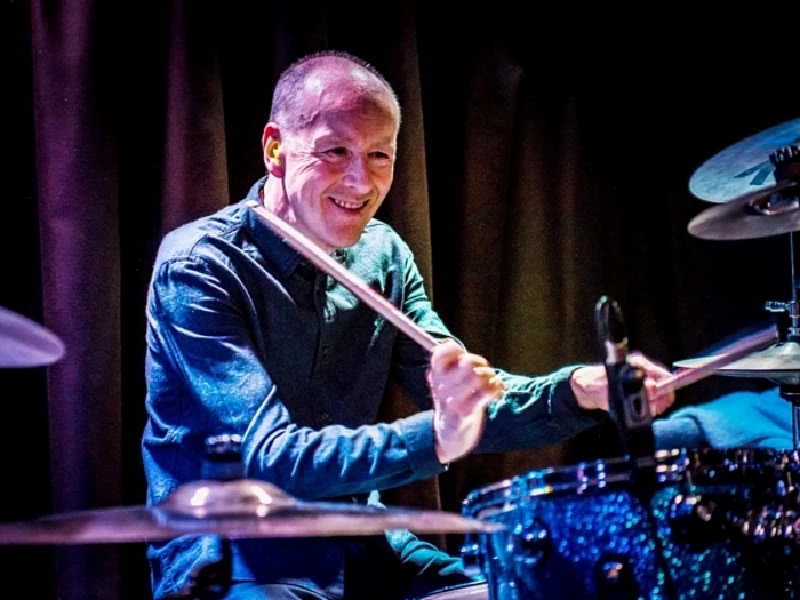
intro
Former Thin Lizzy drummer Brian Downey talks to Lisa Torem about his years with the band, and touring again with his current band Alive and Dangerous.
Drummer Brian Downey was in the band Orphanage with singer-songwriter Phil Lynott before the two talents formed the Irish rock band, Thin Lizzy, in 1969 with electric guitarist Eric Bell. Although the band would enjoy the rotating craftsmanship of guitarists Brian Robertson, Scott Gorham, Gary Moore and Snowy White, Downey enjoyed the status of being the only consistent member until the band dissolved in 1983. Downey went on to record with Lynott in the years before the singer’s death in 1986 and, afterwards, achieved acclaim as a versatile, uninhibited rock drummer and songwriter. More recently, Downey has formed his own band, Alive and Dangerous, with lead guitarists Brian Grace and Phil Edgar and bassist Matt Wilson. The band pays tribute to one of Thin Lizzy’s most dynamic albums, ‘Live and Dangerous’, a double-album recorded in four studios and then released in 1978. Perhaps Thin Lizzy are most well-known for ‘The Boys Are Back in Town’ from their sixth album, ‘Jailbreak’ released in 1976. This compelling tune continues to rock international charts. On the heels of a successful fall tour, Alive and Dangerous, return to London’s Camden Underground on November 7th and will embark on a U.K. tour in February. Downey reminisced with Pennyblackmusic about his Thin Lizzy days, updated us on his recent touring plans and reacted to news that Thin Lizzy is being inducted into the Rock and Roll Hall of Fame. PB: Thin Lizzy’s twin-guitar structure ultimately influenced the likes of Judas Priest and Iron Maiden in the 1970’s, not to mention Metallica. What an innovation! How did it come about? BD: The idea for the twin-guitar solos was when Eric Bell decided to leave the band onstage in Belfast. Phil and myself had a meeting a month later after Eric decided to leave the stage. It became the decision that, instead of having one guitar player in a three-piece band, we’d have to have two guitar players. The idea was that if one guitar player left the band at least we’d have another guitar player to carry on the tour or even the gig, so that was the original idea. Phil was so upset when Eric left. He was so frightened and scared that he’d get into that situation again so he decided at the meeting that it wasn’t going to be a three-piece band, it was going to be a four-piece, and he had absolutely no idea what was going to happen. There was no master plan or anything like that. It just transpired that he had to have two guitar players. That transformed into the “jewel” stuff that I’ve come to love over the years. Obviously it influenced other bands and other musicians but the original idea was just to cover in case somebody left (Laughs). That was the original idea but obviously it transformed the whole band, although it took over after a period of time, not knowing that sometime in the future it was going to transform guitar playing. It took a few years to develop that style with Brian Robertson and then it took a few years to develop, so, when we were in the middle of it, we didn’t know we were going to be so influential in years to come. It wasn’t even envisaged until much, much later. The band had broken up at that stage and Phil was on the verge of passing away to put it bluntly. About ten years after Phil died, people started saying, “We got our influence from Thin Lizzy and the dual-guitars.” It was great to see, it was great to know that happened, but when the original idea came up of having two guitarists, it wasn’t envisaged at all. PB: A video of your current band, Alive and Dangerous’, performing the stunning ballad: ‘Still in Love with You’ (‘Nightlife’, ‘Live and Dangerous’) at the Raismes Festival in September is featured on your website. As a drummer, what’s it like to set the tone for twin-guitars in a song with an abrupt tempo change? BD: There’s only one tempo change at the end- it’s not that difficult and it goes into a kind of funky, mid-tempo kind of groove. It started as a slow, bluesy kind-of ballad with a very definite beat, but, as the song goes on, it builds tension and by the time it comes to the change in tempo people are ready for it; the musicians are ready for it. The change in tempo was absolutely perfect. Phil's idea was spot-on. I didn’t even have to warn him about it. It was so perfect. That’s the way it happened. It just transpired. He wanted to put in a time change, a tempo change at the end and it worked perfectly in the song, but that was part of the arrangement. When the song was written by Phil Lynott/Gary Moore and when I heard the actual song from start to finish, I just knew it was a great song. I just knew the change of groove was perfect for the song. It wasn’t a difficult part to get my head around at all. It felt very natural to play it because the way it was explained to me. There was no lack from Phil of conveying his musical thoughts. And he was very good on it. It was a very natural change. I didn’t feel it was difficult by any means. It was perfect for the song. If you listen to it today, you just hear that bit of tempo change at the end and we’ve taken off on a little bit of a jaunt. It wasn’t too long, honestly, but it was definitely a change for the better. It was a jam that sort of consolidated that whole emotional thing that Phil was trying to convey in the song that was just perfect to sum the whole thing up at the end of the tune. That’s why that was inserted in there. PB: I read that ‘The Boys Are Back in Town’ was almost passed over as a promotional single. Surprisingly, it was considered “too aggressive” for radio play. BD: That’s the first I’ve ever heard of that. That’s completely new on me. I didn’t know they had a problem with the song; although it could have happened in America, I don’t think it happened on this side of the world. Maybe the American market had doubts about an aggressive song being released as a single. I don’t remember that happening here. If that were the case, and there were some queries about the aggressiveness from America, well, our record company would obviously take that onboard and would go ahead releasing the song on the European market and even the world, and maybe they had ideas about releasing something else for the American market but I don’t really think that was the case at all; maybe they had a negotiation with the American promoter; it’s never cropped up in any other interviews that I’ve had before. PB: It was surprising to me as well, especially given the fact that the song became a major U.S. hit. Along those lines, the song still receives tons of radio play in the U.S. and is heard on sound systems in shopping malls, coffee shops, etc. Recently I saw a political satire on an American comedy show. The song was played for effect as a clip of Donald Trump and his Ukrainian cohort appeared onscreen. My point is that ‘The Boys Are Back in Town’ is still so pervasive. Why has the song had such lasting appeal? BD: Wow, I assume it’s because it’s a very catchy kind-of-different tune. You can’t hear that kind of vibe on radio anymore. It’s a real mixture: it’s got great lyrics and the musical content obviously is a big factor as well. I’ve got no idea why it’s lasted this long. I still love playing it with the guys and I loved playing it with Lynott. It’s just become one of those timeless songs over the years, one of those tunes that everybody seems to know from back in the 70s. You can be in a serious mood, have a bit of a downturn, and by listening to the groove, the tempo and the vibe… Maybe that’s what it is. It fits a different set of emotions for every situation. It’s just one of those great tunes that pops up every so often on the pop charts from the 70s. There are lots of them around. All the songs from that era sound pretty good to me but I’m from that era. It’s one of those timeless classics that will, hopefully, be there forever but I still love playing it and that’s the main thing, I suppose. It’s still fresh. PB: Your new band Alive and Dangerous is returning to the Camden Underworld in London on November 7th. BD: Yeah, we’re returning there next month. We had a gig there last year. It’s one of those clubs that drag you back again to the old days. It’s not too big and sweaty. It has a great sound. The atmosphere in there is packed, and afterwards, you have a lot of fun, hanging around for autographs. It’s one of those relaxed situations with not a lot of pressure on. It’s a major gig for us; we don’t play London that often and it’s a great pleasure to play there. There’s a great audience, great atmosphere, great architecture. It’s a great reception we get there. We’re really looking forward to playing the Underworld. We also play at a place called Nell’s Jazz and Blues Club--that’s another great club in London. We played there twice before in the 1960s and 1970s. So London has those great clubs where the music hearkens back to the late 1960s, 70s and even the 80s. It always great to play there. The day after Camden, we’re playing a festival in the North: Great Yarmouth, East Anglia. It will be a bit of a journey to get to that gig, the two gigs being back-to-back. Everybody’s really stoked. We’re looking forward to playing those two dates. And then we’ve got a tour coming up in February with Don Airey and friends - that’s another couple of days we have in the U.K. PB: What can you tell us about the material selected for touring set lists? BD: The band is called Alive and Dangerous, so we concentrate mostly on the ‘Live and Dangerous’ album, even though we could obviously play other tunes as well. We’ve done songs from ‘Black Rose’ as well, Hopefully, during the next year, we’ll be able to incorporate more tunes from ‘Black Rose’ into the set. We’ll obviously have to drop a few tunes from the ‘Live and Dangerous’ album to get the ‘Black Rose’ tunes in there. It won’t be a rush, because now we have plenty of time to rehearse and that’s the way it should be obviously. So we’ll be happy to take the time to get the rest of the tours right. We carry and cover these songs into the set to the next tour in February and any of the tours after that, so it’s going to be slightly different than the previous sets, with the core of the ‘Live and Dangerous’ album there but that won’t be difficult at all. PB: Thin Lizzy is going to be inducted into the Rock and Roll Hall of Fame. What was your first thought when you heard the news? BD: It is about time! (Laughs). It’s a long time to be waiting for an award. But it’s just great to see that somebody nominated us for the Rock and Roll Hall of Fame in America. It’s incredible to think that we’re still remembered. It’s really hard to be successful in America, let’s face it. I think, we were the world’s worst enemies in some respects because when Phil came down with hepatitis from taking drugs and stuff; I don’t really know how he came down with hepatitis, but that could have been avoided, and when we could have played in America, we didn’t. What would have happened if we did go ahead? Maybe we would have been huge in America. We just had so many unfortunate situations. And Brian Robertson cutting his hand before a major American tour wasn’t wise - It just wasn’t wise that that happened and we had to cut the tour, where Gary Moore rehearsed to play it. If Brian didn’t get glass in his hand on the night before the tour, he would have been able to do the tour from day one, and who knows what the results of that would have been? We had so much bad luck before various American tours: with Gary Moore, we had to get Midge Ure to replace him halfway through an American tour. Obviously, the promoters got sick of us and wanted to leave us alone. That’s what stopped our progress in the American tours, just bad luck. Unfortunately, incidents like this, that happen on the eve of major tours, just ruin the band’s momentum. They couldn’t do anything about it, just had to take the consequences and the consequences were that the promoters didn’t want to book us in America. That was the fate for the band’s progress. Those bad decisions completely stopped our momentum in America but that could not be reversed over the coming years. But lucky enough, we had one hit single and a couple of really good tours, even though we were handicapped a little bit, so we were able to achieve a little bit of success in the States but who knows what would have happened if we didn’t have that bad luck? I think, we could have been quite massive in America if we hadn’t had those unfortunate incidents. PB: Thank you. Brian Downey's Alive and Dangerous are playing the Camden Underworld on Thursday 7th November. The top photograph was taken by Laurence Harvey and the second and third photographs by Larry Canavan.
Band Links:-
https://en.wikipedia.org/wiki/Thin_Lizzyhttps://www.briandowneysaliveanddangerous.com/
https://www.facebook.com/briandowneysaliveanddangerous
http://www.thinlizzy.org/
Picture Gallery:-
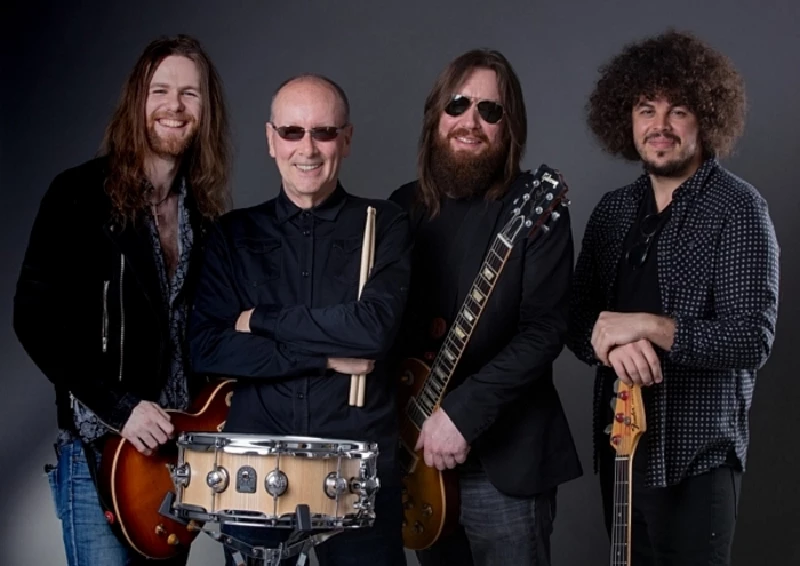
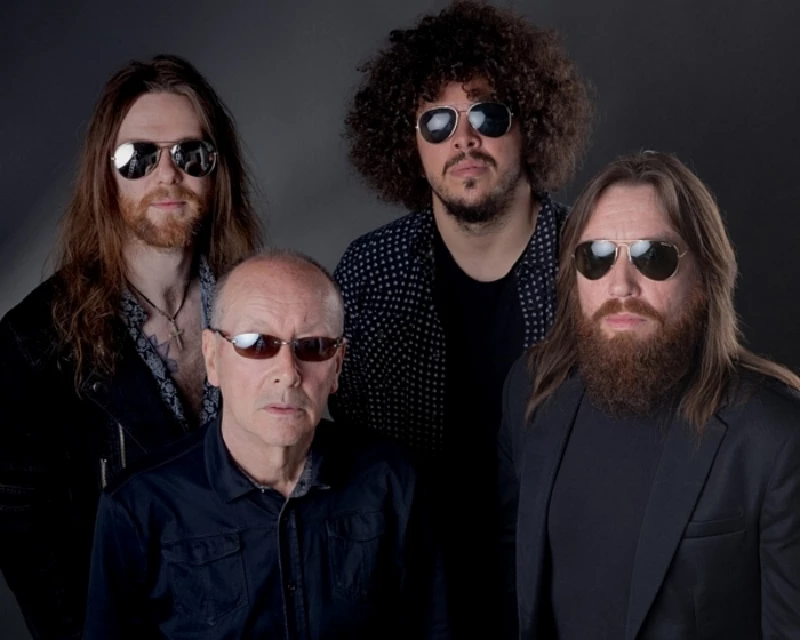
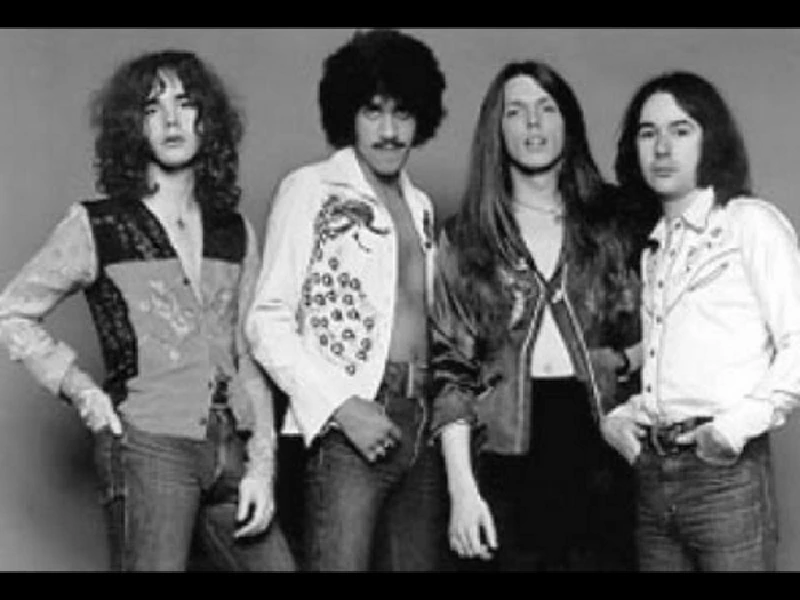
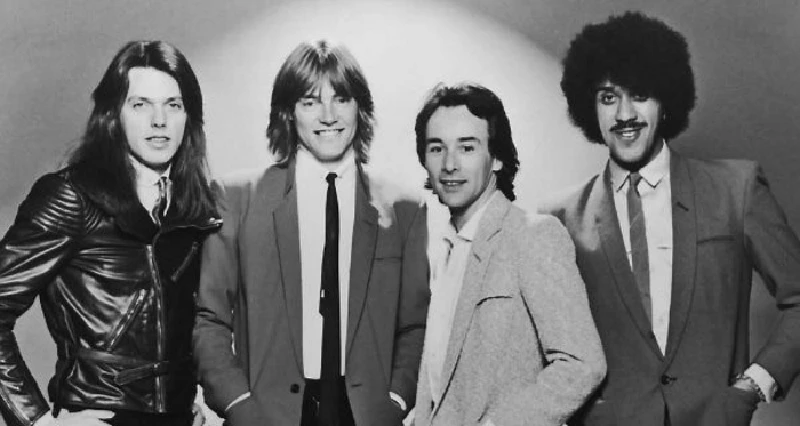
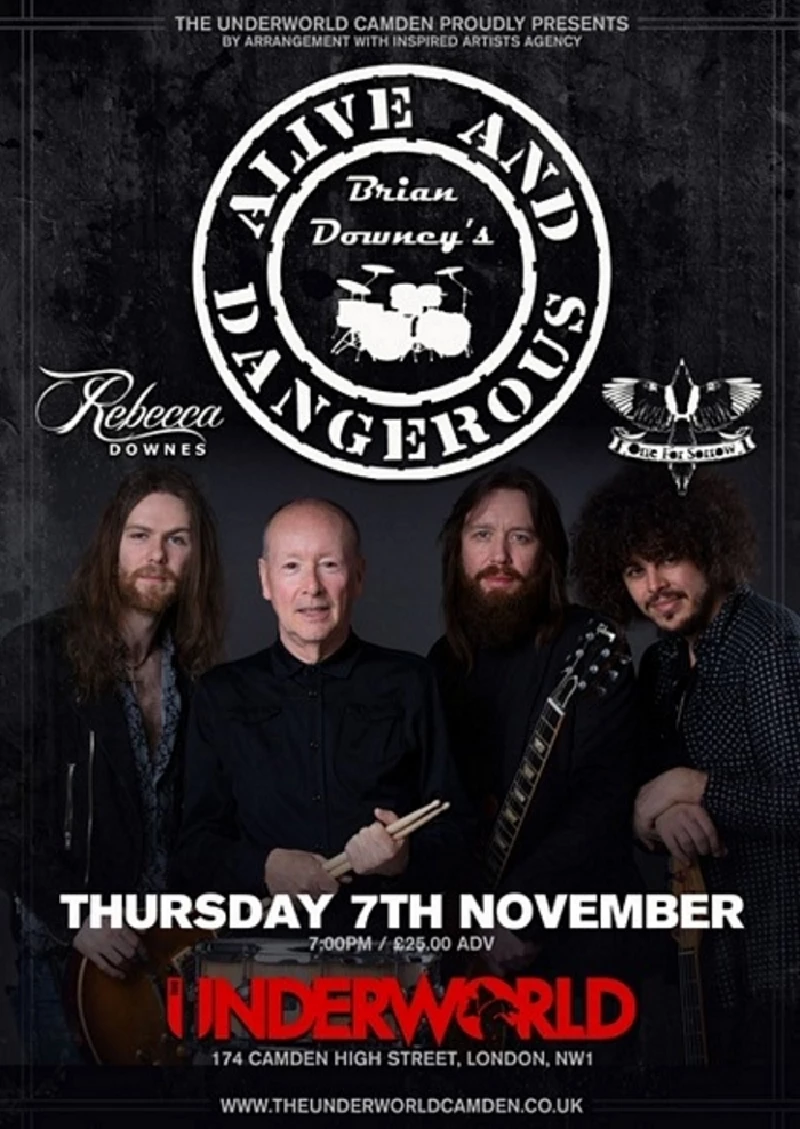
most viewed articles
current edition
Carl Ewens - David Bowie 1964 to 1982 On Track: Every Album, Every SongArmory Show - Interview with Richard Jobson
John McKay - Interview
Colin Blunstone - Thalia Hall, Chicago, 16/7/2025
Billie Eilish - O2 Arena, London, 10/7/2025
Bathers - Photoscapes 1
Visor Fest - Valencia, Spain, 26/9/2025...27/9/2025
Loft - Interview
Sir Tim Rice - Interview
Robert Forster - Interview
previous editions
Manic Street Preachers - (Gig of a Lifetime) Millennium Stadium, Cardiff, December 1999Heavenly - P.U.N.K. Girl EP
Beautiful South - Ten Songs That Made Me Love...
Oasis - Oasis, Earl's Court, London, 1995
Peter Perrett - In Dreams Begin Responsibilities Interview Part One
Boomtown Rats - Ten Songs That Made Me Love....
Coldplay - Wembley Arena. London, 16/8/2022
Prolapse - Interview
Pixies - Ten Songs That Made Me Love...
Trudie Myerscough-Harris - Interview
most viewed reviews
current edition
Davey Woodward - Mumbo in the JumboSick Man of Europe - The Sick Man of Europe
Lucy Spraggan - Other Sides of the Moon
Amy Macdonald - Is This What You've Been Waiting For?
Phew, Erika Kobayashi,, Dieter Moebius - Radium Girls
Bush - I Beat Loneliness
Suzanne Vega - Flying With Angels
Alice Cooper - The Revenge of Alice Cooper
Cynthia Erivo - I Forgive You
Blueboy - 2
Pennyblackmusic Regular Contributors
Adrian Janes
Amanda J. Window
Andrew Twambley
Anthony Dhanendran
Benjamin Howarth
Cila Warncke
Daniel Cressey
Darren Aston
Dastardly
Dave Goodwin
Denzil Watson
Dominic B. Simpson
Eoghan Lyng
Fiona Hutchings
Harry Sherriff
Helen Tipping
Jamie Rowland
John Clarkson
Julie Cruickshank
Kimberly Bright
Lisa Torem
Maarten Schiethart